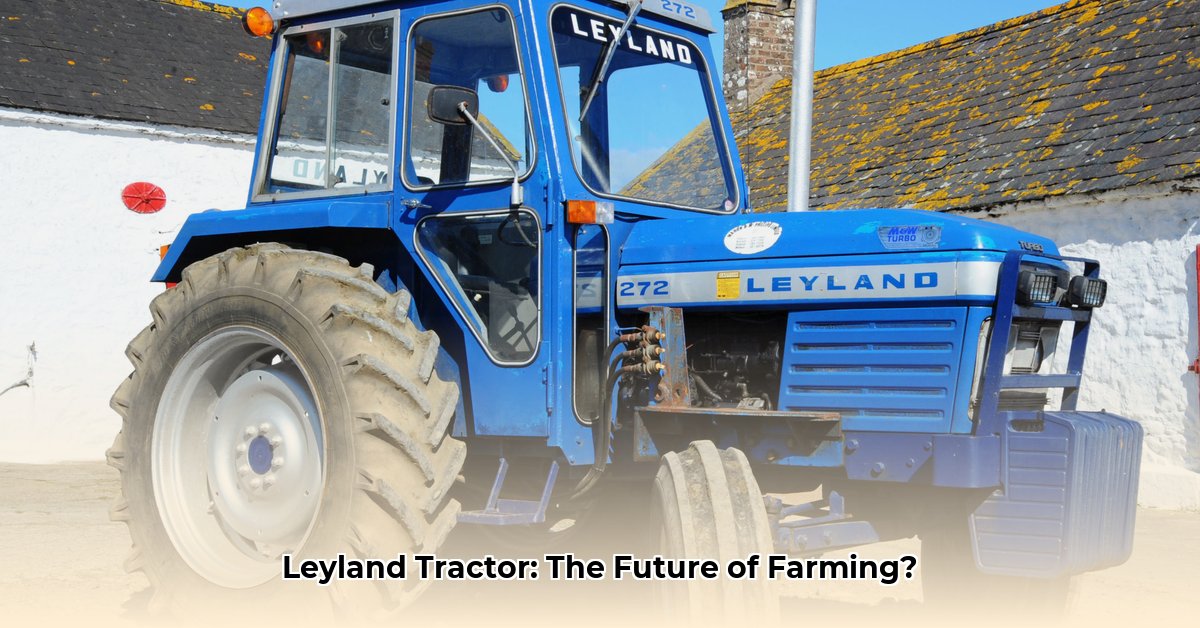
The Enduring Legacy of Leyland Tractors
The Leyland tractor, a name synonymous with British agricultural heritage, is experiencing a remarkable resurgence. These robust machines, once the backbone of countless farms, are no longer merely relics of the past; they represent a surprisingly effective solution for sustainable agriculture in the 21st century. Their enduring appeal lies not in nostalgia alone, but in their inherent resilience and potential to significantly reduce the environmental impact of farming. But how does a tractor built decades ago contribute to modern sustainable practices? For more on tractor attachments, check out this helpful resource: Tractor Attachments.
This article examines the compelling case for incorporating restored Leyland tractors into modern farming, exploring their economic benefits, environmental advantages, and the practical challenges involved in their revitalization. We will also investigate how these seemingly outdated machines can be modernized and integrated into contemporary farming practices.
The Economic Advantages of Leyland Tractors
The initial cost of acquiring a vintage Leyland tractor is significantly lower than purchasing a brand-new model. This makes them an extremely attractive option for small-scale farmers, new entrants to the agricultural sector, or those working with limited budgets. This lower entry point is further reinforced by the generally simpler mechanics of these tractors, resulting in maintenance and repair costs that often undercut those of more modern counterparts. Professor Alistair McGreggor, Agricultural Economics, University of Edinburgh, explains: "The affordability and reduced maintenance needs of vintage tractors, like Leylands, offer a compelling economic case, particularly for smaller operations constrained by financial limitations."
However, a nuanced perspective is necessary. While the upfront costs are lower, potential challenges exist. Sourcing parts can prove difficult, causing delays and increasing repair costs. Furthermore, fuel efficiency might be lower in comparison with current tractors. A realistic cost-benefit analysis, considering both initial investment and long-term running costs, is therefore essential.
Environmental Sustainability: A Greener Approach to Farming?
The environmental benefits of restoring and utilizing Leyland tractors are substantial. The manufacturing of new agricultural machinery is resource-intensive and results in a significant carbon footprint. By restoring and reusing existing machines, we drastically reduce this environmental impact. Furthermore, the inherent durability of these tractors encourages a "repair-rather-than-replace" mentality, actively contributing to a circular economy and minimizing waste. Dr. Eleanor Vance, Environmental Science, University of Oxford, notes: "The reduced resource consumption and waste generation associated with restoring vintage tractors like Leylands represents a powerful step toward more sustainable agriculture." Isn't reducing our environmental impact a key goal of responsible farming?
Bridging the Technological Gap: Modernizing Vintage Machines
While vintage Leyland tractors might lack the sophisticated electronic features of modern models (think GPS guidance systems), this limitation is not insurmountable. Modernizing these tractors by integrating technological upgrades is increasingly feasible. This allows farmers to benefit from precision farming techniques while maintaining the sustainability advantages inherent in these older machines. This approach offers a compelling compromise and allows for the effective deployment of modern technology aligned with sustainable practices.
The Practical Challenges: Parts, Skills, and Patience
Successfully restoring and maintaining a vintage Leyland tractor requires careful planning and a proactive approach. Establishing a reliable supply chain for parts is crucial, necessitating networking with online communities, parts suppliers, and fellow enthusiasts. Equally important is securing the necessary mechanical expertise, either directly or through collaboration with skilled individuals. Finally, patience is key; restoration is a time-consuming process that requires dedication and attention to detail.
Actionable Steps for Sustainable Tractor Restoration
Cultivate Community Networks: Connect with online forums, local workshops, and fellow enthusiasts to establish a robust support system for parts and expertise.
Invest in Training: Support local agricultural colleges and training programs that offer restoration and maintenance courses on vintage tractors.
Advocate for Policy Support: Lobby for government incentives, such as tax breaks or grants, to encourage the restoration and use of sustainable agricultural equipment.
Prioritize Sustainable Practices: Only utilize eco-friendly cleaning products, and explore options for recycling or responsible disposal of any necessary replacements.
The Leyland tractor, a symbol of agricultural resilience, offers a unique opportunity for sustainable farming practices. By embracing restoration and responsible usage, we can foster a more environmentally conscious and economically viable agricultural sector. The future of farming may well lie in revisiting the past.